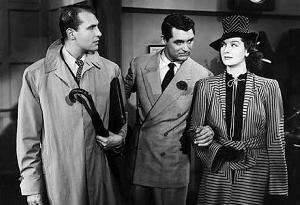His Girl Friday
His Girl Friday (1940) is a Screwball Comedy from Columbia Pictures starring Cary Grant, Rosalind Russell, and Ralph Bellamy, adapted from the play The Front Page by Ben Hecht and Charles MacArthur, and directed by Howard Hawks.
When newspaper editor Walter Burns (Grant) learns that his ex-wife and former ace reporter Hildy Johnson (Russell) is about to marry bland insurance salesman Bruce Baldwin (Bellamy) and settle down to a quiet life as a wife and mother, Burns decides he must sabotage these plans. He entices the reluctant Johnson into covering one last story: the upcoming execution of convicted murderer Earl Williams (John Qualen). After that, Burns does everything he can to keep her from leaving, including having Bellamy arrested over and over on trumped-up changes, and having Hildy's mother-in-law kidnapped, amongst other shenanigans.
This film is noted for its rapid-fire dialogue, and it was #19 on American Film Institute's 100 Years -- 100 Laughs and has been selected for preservation in the United States National Film Registry. Today the film is in the public domain (even though the 1928 play it is based on is still under copyright), which hasn't prevented Columbia Pictures from issuing official video releases of the film.
The Front Page had earlier been filmed in 1931 (with Adolphe Menjou and Pat O'Brien), and was remade again by Billy Wilder in 1974 (with Jack Lemmon and Walter Matthau) and as Switching Channels (with the setting updated to the TV-news era) in 1988.
The film is in the Public Domain, and can be viewed in its entirety at the Internet Archive.
- Belligerent Sexual Tension: Hildy and Walter's infuriated arguing is dripping with sexual tension, which is probably why they hooked up in the first place. The writing is praised today as being remarkably progressive for its time, since the film establishes from the start that theirs is a steadfastly egalitarian relationship: they're both equally pig-headed and stubborn.
- Be Quiet Nudge: Hildy Johnson keeps kicking Walter Burns under the table as he repeatedly insults her dull new fiancé, Bruce Baldwin (who doesn't notice). She ends up kicking the waiter.
- Betty and Veronica: Hildy is torn between two men (note her white and black striped outfit above): stable but milquetoast Bruce (Betty) and exciting but petulent Walter (Veronica). Too bad for Betty, this Veronica is Cary Grant.
- Blatant Lies: Told by the pressmen as they give wildly divergent versions of Earl Williams' capture -- an event they are currently watching -- to their editors. Also, Walter Burns, passim.
- Career Versus Man: Hildy clearly thinks it's what's at stake. She can either give up her job to settle down with Bruce, or rejoin the exciting world of hotshot reporting. The gendered language of her explanation gives away the conflict in her mind: she can stay in New York and "be a newspaper man" or move to the countryside and "be a woman."
- Celebrity Paradox: See Actor Allusion, above.
- The Chew Toy: Bruce.
- Disposable Fiancé: Bruce.
- Gender Flip: This movie is a gender-flipped version of the original play, turning Hildy Johnson into a woman and making it a romantic comedy.
- Getting Crap Past the Radar: The dialogue moves so fast, Russell and Grant managed to slip in a few choice innuendos. For one, Walter greets Bruce by grabbing and shaking his umbrella. When he realizes what he's grabbing he quickly lets go with a snide "Oh, that's wrong, isn't it?" Hildy gets a good jab at Walter too when he says of his body "Hey, I'm better than I ever was." Hildy doesn't miss a Beat and shoots back "Was never anything to brag about."
- Also, over the phone: "He shot him right in the classified ads!... No, ads."
- Girl Friday: Hildy. Co-Trope Namer, with Robinson Crusoe
- Grande Dame: Mrs. Baldwin is close to this type.
- Hot Scoop: Walter and Hildy.
- Insanity Defense: How Hildy intends to save Earl Williams.
- Intrepid Reporter: Hildy.
- Manipulative Bastard / Guile Hero / Heroic Sociopath: Where Walter falls on this spectrum depends on how you interpret his actions throughout the night. Hildy definitely has her moments too.
- Married to the Job: The core conflict is largely about this.
- Motor Mouth: Walter, when he has a good line going. Hildy punctuates the end of an especially rapid rant with "Sold American!" like an auctioneer.
- Noodle Incident: The Albany story.
- One of the Boys: Hildy.
- Public Domain Feature Films
- Romantic Runner-Up: Ralph Bellamy. Surprise, surprise.
- Sleazy Politician: The Mayor and Sheriff Peter B. "Pinky" Hartwell.
- Sliding Scale of Idealism Versus Cynicism: Despite the surface cynicism of the film, the political corruption, the callousness of the pressmen, and Walter Burns' manipulation of all the people around him, there is a strong hint that a free press will ultimately ensure that justice will prevail in a free society.
- Star-Making Role: Rosalind Russell is best known for her role as Hildy Johnson (though some remember her in Gypsy as well.)
- Xanatos Roulette: One would be led to believe that Walter Burns had the entire day planned out exactly as it occurred, including all of the bizarre and seemingly unforeseen reversals of fortune. Either that or he's a master of...
- Xanatos Speed Chess
- Well, Excuse Me, Princess!: See BST above.
